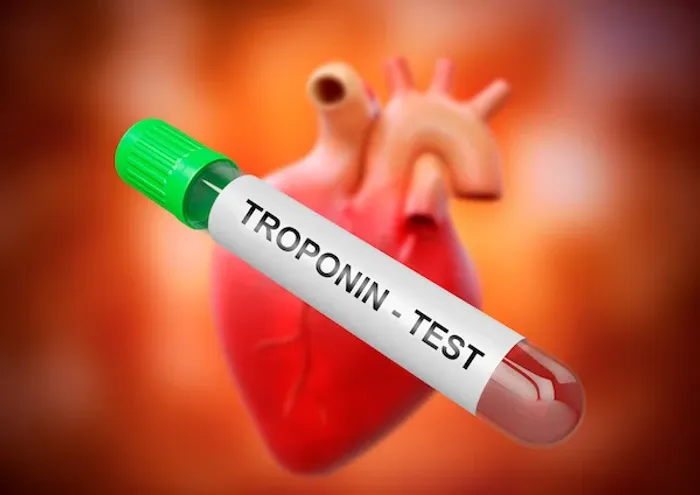Understanding the Troponin Test and Normal Ranges
Learn about the troponin test, its purpose, and normal ranges. Understand how this test helps detect heart damage, diagnose heart attacks, and guide timely treatment.

Written by Dr. Shaik Abdul Kalam
Reviewed by Dr. J T Hema Pratima MBBS, Fellowship in Diabetes Mellitus
Last updated on 1st Sep, 2025

Introduction
When it comes to heart health, certain tests play a crucial role in detecting potential problems early. One such important test is the troponin test, which helps doctors assess whether a person has had a heart attack or is at risk of heart damage. If you or a loved one has been advised to take this test, you might have questions about what it means and why it’s necessary.
In this article, we’ll explain everything you need to know about the troponin test: what it is, why it’s done, what normal ranges look like, and how to interpret the results.
What Is a Troponin Test?
Troponin is a type of protein found in heart muscles. When the heart is damaged, such as during a heart attack, troponin is released into the bloodstream. The troponin test measures the level of this protein in the blood, helping doctors determine if there has been any heart injury.
There are two main types of troponin proteins tested:
- Troponin T (TnT)
- Troponin I (TnI)
Both are highly sensitive markers of heart damage, and even small increases can indicate a problem.
Consult a Cardiologist for the best advice
Why Is the Troponin Test Done?
Doctors usually order a troponin test if a patient shows symptoms of a heart attack or other heart-related conditions. Common reasons for the test include:
- Chest pain or discomfort – Especially if it feels like pressure, squeezing, or heaviness.
- Shortness of breath – Unexplained difficulty in breathing.
- Pain spreading to the arm, neck, or jaw – A classic sign of heart trouble.
- Nausea, dizziness, or sweating – Sometimes, heart issues present with these symptoms.
- Monitoring after heart procedures – To check for any complications.
Since troponin levels rise within a few hours of heart damage, this test is crucial for early diagnosis and treatment.
Understanding Troponin Test Results and Normal Ranges
Troponin levels are measured in nanograms per millilitre (ng/mL). The "normal" range can vary slightly between labs, but generally:
- Normal troponin level: Less than 0.04 ng/mL (some labs may consider up to 0.1 ng/mL as normal).
- Elevated troponin level: Higher than 0.04 ng/mL (or above the lab’s specified cutoff).
What Do High Troponin Levels Mean?
If your troponin levels are higher than normal, it could indicate:
- Heart attack (myocardial infarction) – The most common cause.
- Heart inflammation (myocarditis) – Often due to infections.
- Heart strain from high blood pressure or heart failure.
- Kidney disease – Since the kidneys help clear troponin, impaired function can lead to higher levels.
- Severe infections or sepsis.
Doctors usually repeat the test over several hours to see if levels are rising, which helps confirm a heart attack.
Can Troponin Be Elevated Without a Heart Attack?
Yes! While high troponin usually suggests heart damage, other conditions can also cause a slight increase, such as:
- Intense exercise (marathon runners may have temporary rises).
- Chronic kidney disease.
- Pulmonary embolism (blood clot in the lungs).
- Stroke or severe infections.
Your doctor will consider your symptoms, medical history, and other tests to determine the exact cause.
How Is the Troponin Test Done?
The test is simple and involves:
1. A blood sample taken from a vein in your arm.
2. The sample is sent to a lab for analysis.
3. Results are usually available within 1-2 hours in emergency settings.
Since troponin levels change over time, doctors may test multiple times within 6-12 hours to monitor trends.
What Should You Do If Your Troponin Levels Are High?
If your test shows elevated troponin, don’t panic, but do take it seriously. Your doctor will likely:
- Perform additional tests (like an ECG, echocardiogram, or stress test).
- Recommend hospitalization if a heart attack is suspected.
- Start immediate treatment (medications, angioplasty, or bypass surgery if needed).
Get Your Health Assessed
How Can You Keep Your Heart Healthy?
Preventing heart damage is always better than treating it. Here are some heart-healthy tips:
- Eat a balanced diet – Focus on fruits, vegetables, whole grains, and lean proteins.
- Exercise regularly – Aim for at least 30 minutes of moderate activity most days.
- Control blood pressure and cholesterol – Get regular check-ups.
- Avoid smoking and limit alcohol – Both harm the heart.
- Manage stress – Practice relaxation techniques like yoga or meditation.
When Should You See a Doctor?
If you experience:
- Chest pain or pressure (especially lasting more than a few minutes).
- Shortness of breath with exertion or at rest.
- Sudden dizziness, nausea, or cold sweats.
Seek emergency medical help immediately. Early intervention can save lives!
Final Thoughts
The troponin test is a vital tool in detecting heart damage early. While high levels can be alarming, timely medical care can make all the difference. By understanding the test, its normal ranges, and how to maintain heart health, you can take proactive steps toward a healthier life.
Consult a Cardiologist for the best advice
Consult a Cardiologist for the best advice

Dr. Naresh Munot
Cardiologist
5 Years • MBBS, DM in cardiology
Pune
Apollo Hospitals Pune, Pune
(175+ Patients)

Dr Krishna N D
Cardiologist
10 Years • MBBS, MD Physician, Post Graduate Diploma Clinical Cardio Physician
Dibrugarh
Apollo clinic Dibrugarh, Dibrugarh
Dr. Somnath Madhukar Mallakmir
Cardiologist
10 Years • DM cardiology , MD (Internal Medicine) , PhD
Mumbai
Soham Clinic, Apollo Hospitals, Mumbai
Dr. Raghu T R
Cardiologist
30 Years • MD, DM. Cardio, FACC.
Bengaluru
SJICR Hospital, APOLLO SPECIALITY HOSPITAL JAYANAGAR, Bengaluru

Dr. Zulkarnain
General Physician
2 Years • MBBS, PGDM, FFM
Bengaluru
PRESTIGE SHANTHINIKETAN - SOCIETY CLINIC, Bengaluru
Consult a Cardiologist for the best advice

Dr. Naresh Munot
Cardiologist
5 Years • MBBS, DM in cardiology
Pune
Apollo Hospitals Pune, Pune
(175+ Patients)

Dr Krishna N D
Cardiologist
10 Years • MBBS, MD Physician, Post Graduate Diploma Clinical Cardio Physician
Dibrugarh
Apollo clinic Dibrugarh, Dibrugarh
Dr. Somnath Madhukar Mallakmir
Cardiologist
10 Years • DM cardiology , MD (Internal Medicine) , PhD
Mumbai
Soham Clinic, Apollo Hospitals, Mumbai
Dr. Raghu T R
Cardiologist
30 Years • MD, DM. Cardio, FACC.
Bengaluru
SJICR Hospital, APOLLO SPECIALITY HOSPITAL JAYANAGAR, Bengaluru

Dr. Zulkarnain
General Physician
2 Years • MBBS, PGDM, FFM
Bengaluru
PRESTIGE SHANTHINIKETAN - SOCIETY CLINIC, Bengaluru
